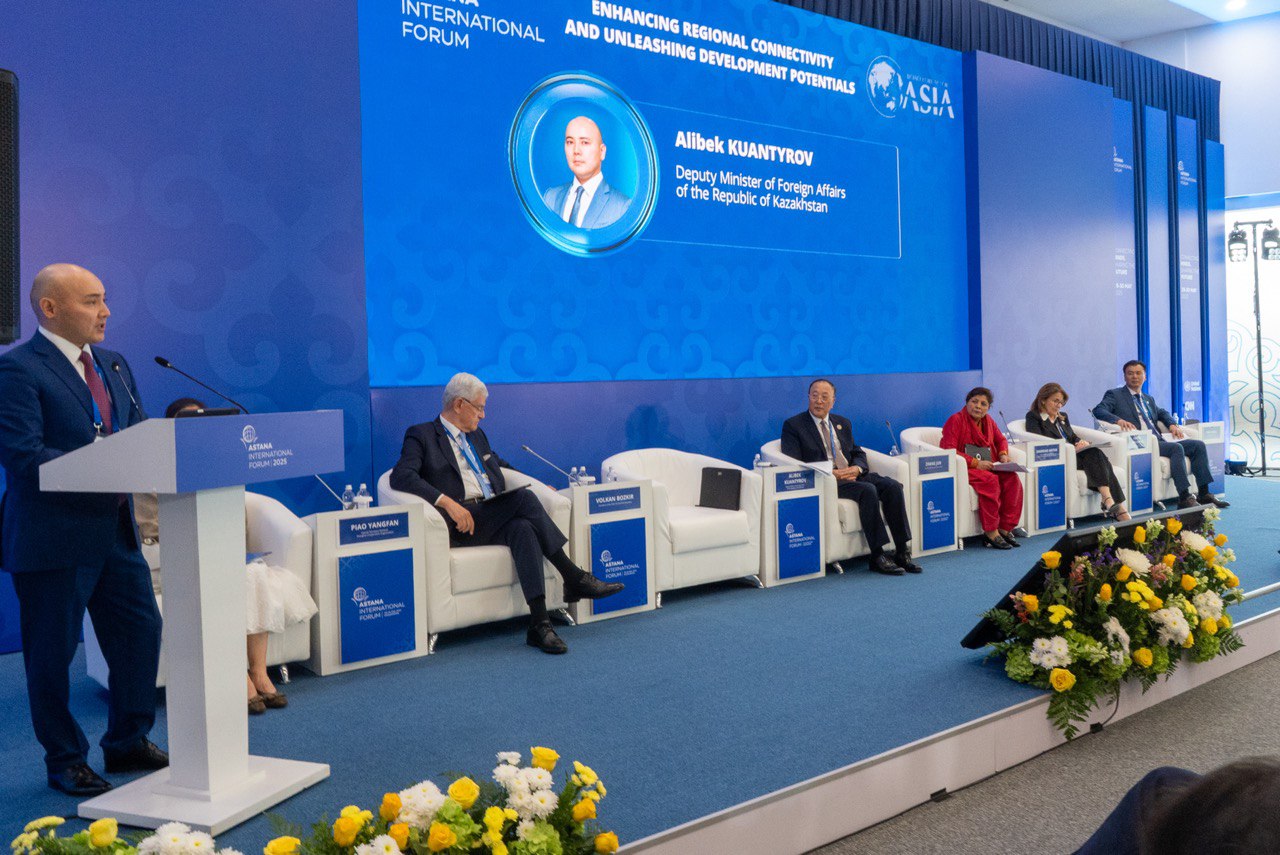Development of the Trans-Caspian Route Discussed at the Astana International Forum

Astana, May 29, 2025 – Deputy Minister of Foreign Affairs of the Republic of Kazakhstan Alibek Kuantyrov took part in the panel session titled “Enhancing Regional Connectivity and Unleashing Development Potentials,” held within the framework of the Astana International Forum and co-organized with the Boao Forum for Asia. The discussion focused on expanding transport and logistics connectivity across Eurasia and the key opportunities tied to the development of the Middle Corridor.
The session featured high-level speakers, including the Chairman of the Boao Forum for Asia and 8th UN Secretary-General Ban Ki-moon, President of the 75th UN General Assembly Volkan Bozkır, Boao Forum Council Member and former UN Under-Secretary-General Shamshad Akhtar, OECD Deputy Secretary-General Fabrizia Lapecorella, SCO Deputy Secretary-General Piao Yangfan, and Managing Director of the Silk Road Fund Feng Yanqiu. The session was moderated by Boao Forum Secretary-General Zhang Jun.
In his remarks, Alibek Kuantyrov outlined Kazakhstan’s strategic vision to transform the Trans-Caspian International Transport Route (TITR or Middle Corridor) into a key artery of sustainable Eurasian logistics. He stressed that for Kazakhstan, the TITR is not merely a transit route but a platform for industrial growth, digital integration, and the formation of international production-logistics chains.
He noted that Kazakhstan currently provides over 3,500 km of critical railway infrastructure connecting the Chinese border to Caspian Sea ports. In the coming years, cargo throughput is expected to increase to 10 million tons, reflecting growing demand from global supply chain participants and Kazakhstan’s efforts to enhance corridor capacity.
“The TITR is not just a logistics route, but an infrastructure of trust, efficiency, and growth. Kazakhstan is committed to integration – both physical and digital. We are seeing real results: in March 2024, a container train from Xi’an arrived in Azerbaijan in just 11 days, with only three days spent crossing Kazakhstan. This was made possible through upgrades on the Dostyk-Moyynty segment, development of the Khorgos hub, and implementation of digital customs solutions. We are investing over 35 billion US dollars into infrastructure – building new railways, expanding the Aktau and Kuryk ports, and creating a container hub in cooperation with international investors. But our goal is not just transit. Kazakhstan sees the TITR as a platform for industrial growth and sustainable integration into global supply chains,” emphasized Deputy Minister Kuantyrov.
Speakers during the session underscored the importance of building resilient global and regional supply chains, particularly amid the increasing fragmentation of the global economy. Ban Ki-moon highlighted that connectivity is not only about physical infrastructure, but a cornerstone for sustainable and inclusive development. Volkan Bozkır emphasized the need to preserve multilateralism in times of global crisis. Representatives of the OECD, SCO, and Silk Road Fund stressed the importance of combining hard infrastructure with soft mechanisms such as regulatory harmonization, digitalization, and financial facilitation.
Participants unanimously agreed that regional connectivity encompasses more than just transport – it also entails institutional trust, shared standards, and coordinated digital transformation. They expressed their readiness for continued dialogue and practical cooperation to foster sustainable and mutually beneficial Eurasian integration.